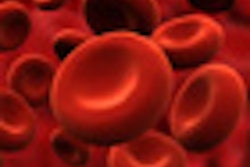An oral surgery protocol to control bleeding for heart patients taking anticoagulant medications has shown positive results, according to a study in the Journal of Oral Implantology (December 2011, Vol. 37:6, pp. 681-690).
Cardiac patients who take anticoagulant medications and need a tooth extraction face an increased risk of bleeding that must be addressed by the treating clinician. Therefore, a protocol for heart patients is needed that will avoid significant bleeding after dental extractions without suspending anticoagulant therapy, according to the study authors, from University Federico II in Naples, Italy.
This study evaluated the use of leukocyte- and platelet-rich fibrin biomaterial, which is commonly used in dentistry to improve healing and tissue regeneration. It was tested in dental extractions in 50 heart patients as a safe filling and hemostatic material after oral anticoagulant therapy.
After the patients had mechanical valve substitutions, they were placed on anticoagulant oral therapy with warfarin. It is not recommended that the anticoagulant be suspended and replaced with heparin before a minor surgery, although this substitution may control the risk of postoperative bleeding, the researchers noted.
One method of controlling bleeding without suspending the anticoagulant is using platelet-rich plasma gel placed in postextraction tooth sockets. Although this protocol has been successful, there are barriers to its daily use. The platelet concentrates are expensive and are time-consuming to prepare.
Platelet-rich fibrin offers an alternative biomaterial that is simple and inexpensive to prepare. Blood is collected in tubes without anticoagulant and centrifuged. It divides into three layers, creating a strong platelet-rich fibrin clot in the middle layer. Platelet-rich fibrin has proved useful in daily dental practice as a filling material for regeneration for implants placement.
Following an anticoagulant therapy, the patients in this study were treated with leukocyte- and platelet-rich fibrin clots placed into postextraction sockets. Only two patients developed bleeding complications, and 10 had mild bleeding, the researchers reported. All complications were resolved within a few hours after the oral surgery.
The researchers found no painful events, quick healing of soft tissue, and complete wound closure within one week after oral surgery. Leukocyte- and platelet-rich fibrin offers an excellent option for use in heart patients on an anticoagulant regimen, the study authors concluded.



















